#ReUnion Process
Explore tagged Tumblr posts
Text

First off, what is inherited trauma? It’s the emotional, psychological, and biological imprint of your family’s unresolved trauma—passed down through generations. You might feel it as: - Chronic anxiety - Fears you can’t explain - Unexplained health issues - Obsessive thoughts and habits But let's see what science says ↓
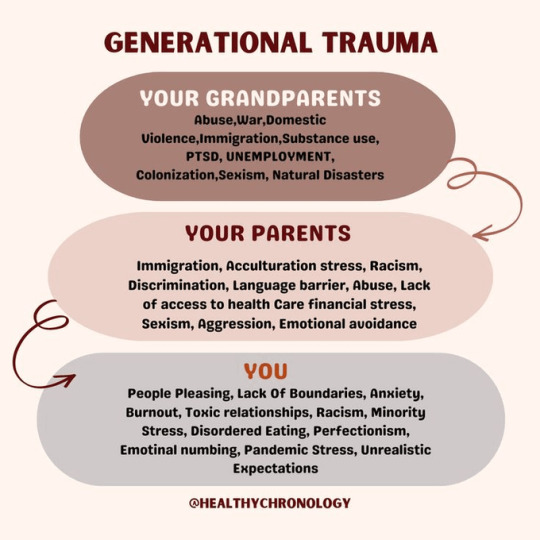
Scientists have discovered that trauma changes your genes. When your ancestors experienced trauma (war, poverty, abuse), their bodies adapted to survive. These changes—called epigenetic tags—alter how genes are expressed. Translation? You inherit more than their hair color. You inherit their survival responses.
Trauma doesn’t just shape your emotions—it rewires your biology. Studies prove it. - Offspring of Holocaust survivors exhibited altered stress hormone profiles, predisposing them to anxiety disorders and PTSD. - A study of Ukrainian families affected by the Holodomor famine revealed transgenerational impacts such as anxiety, shame, food hoarding, and authoritarian parenting styles. These biological adaptations were once survival mechanisms but now they are inherited...
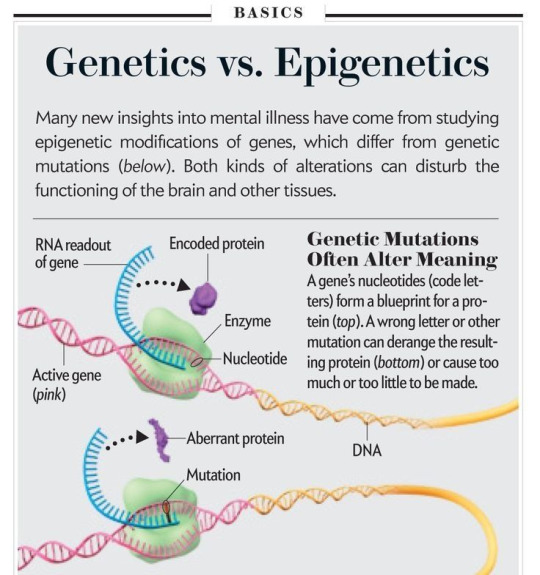
How do you know if you’re carrying inherited trauma? Here are common signs: - Recurring family patterns (addiction, conflict, failure). - Fears or beliefs that feel irrational. - Chronic stress or illness with no clear cause. These patterns will persist until they’re consciously addressed.

But here’s the good news: You can break the cycle. Healing inherited trauma doesn’t just change your life—it transforms future generations. Epigenetics changes are not permanent— they can be changed through therapeutic works at any time. As a holistic therapist, here’s what I’ve seen work best:
Step 1: Explore your family Genogram. What unspoken events shaped your family? - Loss, war, migration, abuse, or betrayal? - Secrets, silences, or "taboo" topics? Understanding these root events is essential to healing.
Step 2: Recognize inherited language. Listen for repeating family phrases: - "We never get ahead." - "It’s hard to trust people." - "Love always ends in pain." - "Money doesn't grow on trees" These beliefs often reflect unhealed trauma passed down to you generationally...
Step 3: Rewire your nervous system Inherited trauma isn’t just emotional—it’s stored in your body and nervous system. In my experience as a therapist, neuroscience-based tools are the most effective at directly healing trauma in the mind-body system. Talk therapy often falls short at this. Here’s what works instead ↓
Proven Neuroscience tools for healing: • Somatic therapies: TRE (Tension Release Exercises). • Breathwork: Polyvagal breathing to calm the nervous system. • Meditation and mindfulness: Rewire emotional responses. These tools directly reset your body’s stress response, creating lasting change...
Step 4: Rewrite the narrative. Trauma may have shaped your family story, but it doesn’t define you. Use Narrative Therapy (CBT) to shift limiting beliefs: - “I’m safe to succeed.” - “Love doesn’t have to hurt.” - “I’m free to create a new path.”
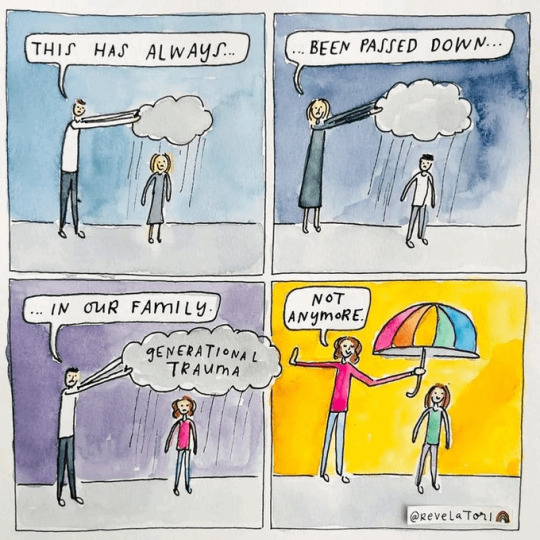
You’re not broken. Inherited trauma isn’t a life sentence—it’s a calling to heal what others couldn’t. When you do the work, you don’t just free yourself. You free your family’s past and future.
[Brian Maierhofer]
#Brian Maierhofer#trauma#bodywork#Structural Integration Atlanta#Body Alive#ReUnion Process#generational trauma#epigenetics#therapy#psychology
10 notes
·
View notes
Text
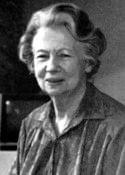
A longer than average, even attention-demanding (by fb standards, certainly) and powerful, nourishing read.
+
The Human Place
An Interview with Pauline de Dampierre
Much has been written about a certain spot in Paris where a kind of inner fire was kept burning throughout the dark days and nights of the German occupation. In a small and crowded apartment in the rue des Colonels Renard, a strangely assorted group of people met nightly to listen with absorbed attention to an Armenian Greek named Gurdjieff, to eat the amazing meals he cooked for them, and to hear read aloud the still-unpublished Beelzebub’s Tales to His Grandson.
Pauline de Dampierre was one of the circle. She was a young attorney who turned journalist after the war was over; but like many another of the gifted young, she was not destined to follow either of the careers she had originally chosen for herself. Her meeting with Gurdjieff was definitive. After it, her professional work continued only as a means for living and a ground for self-study. After Gurdjieff’s death in 1949 and until the present, she has continued, in company with others of that same circle, the process of work on his teaching, for herself, and with the many new people who have come asking to know more about the enigmatic Master and the ideas he expressed.
~ • ~
PARABOLA: I have been very much interested in the definition at the end of the introduction to Gurdjieff’s book, Meetings with Remarkable Men. He says, “He can be called a remarkable man who stands out from those around him by the resourcefulness of his mind, and who knows how to be restrained in the manifestations which proceed from his nature, at the same time conducting himself justly and tolerantly towards the weaknesses of others.”
PAULINE DE DAMPIERRE: Yes. He can be just in front of the weakness of the other, because by having learned to contain his own manifestation, he knows what he is; and he knows what the difficulty is. There is a Zen story that I think illustrates this very well. A blind man was listening to a conversation going on near him, and suddenly he cried out: “Oh, what an extraordinary man! I have never heard anything like it!” When he was asked what he had heard that was so remarkable, he explained: “You know that blind people always develop a very fine sense of hearing. Now, in my entire life, I have never heard someone congratulate another for some good fortune without hearing in his voice at the same time a note of jealousy; and I have never heard anyone sympathize with misfortune without hearing in his voice a shade of superiority or of satisfaction because he himself was spared. But in the voice of this man who just spoke, when he spoke of happiness I heard only happiness, and when he expressed sorrow, I heard nothing but sorrow.…”
The man he had listened to was in fact a monk, a great Buddhist saint. Maybe you could say he was a “whole man.”
But I don’t mean by this to say that only people who reach this degree should be called “real”; because between the fully realized man who has attained the greatest development possible, and the ordinary contemporary man—“a slave entirely at the disposal of tendencies which have nothing to do with his true individuality”—there is room for another category of mankind: those who search for a way toward truth. In other words, one might say that these are people who have discovered a truth in the words of the blind man that goes far beyond a mere clever observation, which concerns them very deeply. They have seen that these almost unconscious states of feeling into which they let themselves fall are just one aspect of a much more serious problem—a fundamental problem, basic to their whole life. So they have decided to put everything they have into confronting it.
How do you feel the “whole man” relates to the idea of sin?
What interests me is what is at the source of what we call sin. Usually we see sin as a manifestation of a certain intensity, or as an action which is exaggerated, bad, harmful. But what is at the source of that action? Compared to the source, the action is only an excrescence—something that bursts through from an undercurrent which is always acting in human beings.
The undercurrent of tendencies from which these impulses arise is a part of the whole man.
These are motivating forces?
Usually these tendencies have a much greater influence on our behavior than we imagine. They are always moving, and they are at the root of what has been called our automatism. If a person were to stop all his outer and inner movements at a given moment in order to see what is acting in him, he would nearly always feel a tendency which has about it something narrow, something heavy, something with a negative aspect that tends to be against, to be egoistic. All that is usually going on unseen. But if he tries to awaken to what is going on in himself, to be sincere, he will be able to witness, in addition to what could be called the “coarse” life in him, another life of another quality—much subtler, much higher, lighter—that is also a part of himself. The contact with this other quality of life helps him to have a quieter presence, a deeper vision. And he feels an urge at that moment to be open to a quality of this sort that would have a force, that would be a center of gravity. He begins to search for a way to serve what he feels would be his real being.
Then he begins to really know that if he lets his attention, his interest, to be taken by his automatic tendencies, it deprives him of contact with that other source of life he is searching for. It could be said that there is a continual tendency to sin, in that sense. When these sins are spoken of as deadly, it means that these tendencies—if they are allowed to rule—at every moment deprive the human being of the possibility of turning towards this real life.
When you speak of this undercurrent, do you mean the passive?
Passive.… To let oneself be continuously led by these automatic, nonconscious tendencies is indeed to be passive. And when a person is passive, the automatic begins to take the initiative, to direct him. When he turns towards something else.…
When he makes a contact between the two?
Yes, then the undercurrent is able to play its normal role—its very necessary role.
Without a search, is there any sin? Is there responsibility without an aim?
It is often said that man in his state of illusion about himself is not responsible, and perhaps in that sense it could be said that there is no sin. But to what extent is he absolutely not responsible?
Is he held responsible at some level?
What we know is that every time we let ourselves go strongly into one of these tendencies, the tendency is strengthened. After a time it becomes very difficult to be free of it. It is in that way I see that one pays for his actions. And what about the harm that has been done to others through us? It is a very serious question.
I’m interested in what you say about these tendencies being natural. If they are natural tendencies, always there as an undercurrent, what are they there for? And what is the difference when they are there as an undercurrent and when they are acted out? Do they become sins only when they are expressed?
One can feel these tendencies as inescapable parts of one’s nature which to a certain extent bring data about oneself and the external world. I have to sustain my life. Many demands come to me from external life and I must sustain my outer life with the ego—as I am, I have nothing else. So it is through these tendencies that the ego is informed.
Take anger, for example. With a little vigilance, it is possible at the beginning of a movement of anger to surprise in oneself the sudden, short upsurge of an instinctive impulse that tends to immediately reject whatever is irritating us, making us suffer. This impulse is necessary—how could we get along without it? We would be inert—we could let our hand stay in a fire without reacting.
Take envy. There exists a law according to which when two masses of unequal size are near one another, the larger provokes a tension in the smaller. I should add that I know nothing about physics and do not know if this law prevails in that domain. But it is indubitably among the psychic influences that act on us, whether we like it or not. Very probably it is thanks to this law that the child instinctively educates itself, seeking to imitate an older person. He admires him, wants to be like him, wants to draw his attention, and if he doesn’t succeed in doing so, he is frightened. For adults, it is exactly the same.
And pride—don’t we teach a child to be proud of his successes, of his strength? Lacking this pride, he wouldn’t respect himself and wouldn’t make himself respected by others.
In a way each one of these tendencies is there to sustain my life at a certain level; they are necessary and healthy. But if I live with them alone, I am an animal. A human being has to stand in between and not allow himself to be taken by these things; not to let them raise opposition and justification. For this he must not let himself identify with them, and this means he must not let them make him forget the one and only thing important for him.
These sins, then, are engines of the ego? They drive the ego?
I would even say that they are engines of our nature, because we can always find these tendencies acting in us. But if one can see them, one can be informed by them instead of being blindly taken.
You were speaking of the ego.… On the portals of certain cathedrals, one can see sculptures representing the vices and, above them, sculptures of the virtues. But between the vices and the virtues, there is something intermediary. And this is not shown. In fact, what remains hidden in the middle is man’s wish to be sincere, to try to understand the meaning of his life. But for this, the underlying current must be perceived, and respected. Then the virtues take on form on their own. It isn’t necessary to seek them directly. They appear.
The rest of the time, it is ego speaking. There is no other alternative.
These virtues do not judge, do not reject, have no violence. They emanate; they radiate. Certain exceptional human beings prove that this is so, and even in someone who is very far from that, the existence of such a possibility can make itself felt.
In a way, it is like saying that only a person who knows fear can be courageous. There is no need of virtue if you don’t have vices!
What is vice? There are many ways to look at the subject—psychologically, analytically, theologically. I have no intention of adding to what has already been said along these lines. I simply want to emphasize one aspect that is rarely brought to light: the role of an inner search in relation to these underlying tendencies. Then the “vices” become simpler. You don’t so much think of them as bad, but you feel strongly, painfully, that they are harmful to what you are searching for. They are there and you don’t allow them to take too much place. You don’t reject them, but you don’t let yourself be engulfed by them, either. Through this process, something can be developed in us.
That brings a note of hope—and it bears on our earlier question about why the undercurrent is there.
What is important is to begin to be able to hold oneself at the source. I heard during my Catholic upbringing that even a saint sinned seven times a day. But I would say that the tendency to sin is at every second.
And it is not one’s fault that it is there?
It is my human place. The power to act is in the body. The wish for evolved being comes from another source. And the two parts must meet. They do not often meet by accident; they meet only when something is acknowledged and held in respect.
These impulses, then, if held at the source, can actually contribute to a continued sense of presence?
My sense of presence will only be real if I take these impulses into account. I may try to open only to something higher—perhaps it is possible in a posture of meditation, but even then not so easy. But the moment I begin to act these impulses are necessarily there, and must be taken into account.
Unquestionably, they have enormous force. It seems that something else of an equal force needs to be there. One can be aware of one of these impulses for a moment, and suddenly be swallowed by it. And then it is the only thing there.
I would say that what is needed is not an equal force but another kind of force, more subtle, more active. As in chemistry, one can take a stone and introduce a very active substance and the stone will dissolve. Well, the wish to be can be very active.
In fact it is not possible to experience an opening towards more freedom without obedience toward something higher. A human being has no other possibility. He may think he can be free, but he is either obedient and submitting to this higher, or a slave. But when he submits willingly, he may receive something of such a high quality that he will no longer be attracted to what enslaves him. Every time we are attracted, we think we find life in that attraction. But at the moment of submitting to this finer force, we feel life of such another kind that we are no longer tempted.
There is a very strong relation between the action of these tendencies and a certain automatism of the body. Of course, we all know how easily tempted we are by physical satisfactions—resting, moving about, food, sexual attraction. But what I’m speaking of is much more hidden, insidious, almost beyond uprooting by ordinary means. It’s a question of a certain “coarseness” inscribed in the body by everything that we have experienced, by the way in which we have allowed ourselves to be led along by these impulses. The body is accustomed to this heavy functioning even if outwardly it seems extremely light and free. The very texture of the body favors these impulses and is reinforced by them. It’s a vicious circle. When there is an opening to something higher, the body quietens, and begins to be impregnated with something more subtle. It finds a kind of inner behavior much more in accordance with this opening. And in that way these tendencies begin not to have such a strong action on the person.
What is the place of feeling, here? Does feeling have no action at all? Is this a struggle only between the head and body?
It is said that we have almost no contact with real feeling. Our emotions are very egoistic. There is no love in them. They always turn me to something other than what is there. When we feel emotions, there is a vibration so quick and tempting that it is difficult to resist. We always think it is our feeling, but it is not our feeling—it is our emotionality. If you observe yourself at that moment, you will recognize that that emotion is not yourself. You have no liberty; you are absolutely engulfed. Yet there is this mysterious power in the human being—to turn also towards a something else in himself that may be very weak, nearly inaudible, but of another quality that he respects more. One could say that real feeling appears at those rare moments when what is happening in the individual is of such quality that his only wish is to be able to remain there, and to serve it as best he can. It is only then that he has a positive feeling of the moment, with no wish to be somewhere else.
There seems to be a sense in which the impulses of envy, avarice, and so on seem to have to do with the future or the past—with images of something that I want, and fear that I will not be able to have. I am taken out of the present moment by wanting to insure something for the future. Do you think these impulses are based on fear?
In our usual state, we have nothing real in us to rely on, so it is necessary for us to create projections and ideas, to have desires of all kinds. We have no aim that would feed our presence. Every real search is about that—to find a place in oneself one could serve, where being could grow and play its role. Then it gives sense to life. When it appears, true relationship begins among the parts of the individual. One sees better, one is clearer at that moment, one is no longer afraid of living. Even outwardly, something is more balanced. Without that, there is never an aim which brings me in contact with the sense of my destiny. But at that moment, no matter how briefly, I see that I am in contact with the aim that I’ve sought. I know what to place my confidence in.
We are almost forced, then, to imagine some kind of reality for ourselves, because we are not in touch with a true reality. We have to create some sort of world to live in.
I would say that we haven’t been taught that we could be open to the growth of a reality in us. It is a great discovery to touch something real and tangible in us—it is the goal of all the traditions, to help the individual toward what is real in him.
There is very little in our society that lends support to a search of this kind. Why should anyone believe you when you say that something more is possible for human beings?
These ideas seem quite alien, it’s true. Today, however, several great currents of spiritual search are trying to give them new reality.
For my part, I would say that one of the most remarkable aspects of Gurdjieff’s thought is that it allows us to start from where we are—from our mortal sins, one might say, or more simply from our predominant faults. It casts a vigorous, surprising, light of truth on our multiple weaknesses, our prison. And it shows us how to listen to another voice, enter into contact with another reality.
How to be touched? One can be deeply touched by contact with someone who has begun to develop this in himself. Or special events can happen in life—a great happiness, a great sorrow, an impression of nature, of sacred art of the past—that can give an extraordinary feeling of much more life in us, much finer, much broader, as if the horizon were opening.
It gives us a taste that life should always be like that. It doesn’t happen often and it comes through events outside of us. But the longing for it is always there. For we are speaking of a human need—the need that makes us alive.
To feel it is to feel that it is true and must be searched for.
A real search is a preparation for an opening to the taste of that life. Gaining knowledge of everything that opposes it is the first step on the path. And it is a great adventure.…
[Thank you Ian Sanders]
#Gurdjieff#teaching#felt sense#feeling#forces#ReUnion Process#Pauline de Dampierre#Ian Sanders#Parabola
2 notes
·
View notes
Text
The yawn stretched Lena’s jaw to the point that she felt like a cat, baring her fangs. Naturally, it prompted a Kara Danvers Pout, which was utterly devastating. Kara looked at her over the top of her drink cup, straw still pursed in her delicate pink lips as she frowned slightly.
“How long have you been awake?”
“I had a half hour nap this morning,” Lena sighed.
She’d been in the office for three days, but she didn’t admit that.
“Leeeenaaaaaaa,” Kara said, drawing her name out into a gentle rebuke. “You promised me you’d stop doing that to yourself. I’m taking you home.”
Lena’s heart skipped and Kara abruptly jerked upright, briefly glancing at her. Lena hated when that happened, when her body betrayed her. Kara meant escort her home; Lena’s thoroughly tired mind had supplied another scenario, one where Kara carried her onto the bed, relieved her of her clothes and dove between her legs, but that was never going to happen. Lena let out a long sigh of resignation, trying to be satisfied with best-friendship.
She hoped Kara hadn’t suddenly developed telepathy.
If you took me home I’d never leave. I could make love to you for a hundred years.
Kara smiled back at Lena’s wistful look. “I mean it.”
“Okay. I can come back to it tomorrow. Besides, I’m too full of grease and cheese to stay awake. Should we…”
Lena never finished her sentence. There was a crackle in the air, a sudden wet smell of ozone, and the thunderous boom that made her ears ring.
Kara flashed in front of her at super-speed, yanking off her glasses and tossing them on the couch in a smooth motion.
Hovering in the middle of her office was some ramshackle contraption resembling a mechanical eye about the size of a basketball that scanned Kara with a faint purple energy ray.
“Kara Danvers. Supergirl. I am Zeglos, Regent of the Alotian Republic. I am calling to you from the home of my people, located in what is to you a subatomic realm we call Universe Q. We need your help, you are our only hope. The invaders are slaughtering us and razing our home. There is no time.”
Kara glanced back at Lena. “I’ll help if I can. Let me-“
“There is no time. You must come with me now.”
“Wait, hold on a second-“
The machine flashed, thrumming as it powered up, and blasted here with a wave of light that surrounded them both, and then in a crackling boom they both vanished, leaving behind the ozone smell and a faint impression of Kara’s boot heels in the carpet.
Lena stared into the empty space for a moment, then shot to her feet, snatching the phone off her desk, where it had lain ignored since Kara walked into the room.
She called Alex, shocked at the blubbering panic in her own voice. Within a few minutes, everyone was there, piling into the room. Lena warded them off from the spot where Kara had stood. Alex was cold and calm, her voice clinical, and she immediately began issuing orders. J’onn took Lena aside and gently asked her probing questions in the manner of an old detective, coaxing every meager detail of the event out of her.
Within half an hour, Brainy and Lena had set up all sorts of equipment around the room, scanning, hoping to find some energy signature or other clue that could enable them to bring Kara back from wherever she’d been taken.
It proved fruitless. They tried everything.
Minutes stretched into hours. Lena was exhausted, heavy with fatigue.
“Go home, get some sleep,” said Alex. “We can’t help her if we pass out on the floor.”
“I’ll sleep here.”
She did, throwing a thin blanket over herself on the couch. It was Alex, not Lena, who cleaned up the Big Belly Burger mess. Lena slept fitfully, showered in the en-suite attached to her office, and changed into an old hoodie that she kept there and wore when no one was looking.
It wasn’t hers. Threadbare, a maroon color faded to a soft red, the back still emblazoned with a cracked and fading Midvale Mathletes Club logo, it was Kara’s. Lena had snatched it from Kara’s sofa and put it on one night when she was feeling bold and then, as now, felt surrounded by it, the oversized garment swaddling her.
And it smelled like Kara, just enough. Kara had stared at her intently for a moment when she took it that night but said nothing, a wistful sad look on her face before the moment was broken by Wynn’s bad joke at the table. Wynn was gone now, but the hoodie remained, just as it had remained when they were fighting, when she thought she’d never see Kara again. She’d worn it then and cried herself to sleep in it.
Just like now.
A day became two. Then three. Five. Lena tried everything, pursued every theory. They called in every favor, human and alien. Brainy tried to send messages to the future. Nia dreamed fruitless dreams. Alex paced like a caged animal and Kelly kept the peace, keeping them all fed, making sure everyone slept, talking things out whenever tempers flared.
Nothing worked.
Lena even tried praying, something she hadn’t done since the last time she was in a small church in Ireland. It didn’t work this time, either.
Lena was seated next to Brainy on the couch, going over a design for a new device to try to follow what was by now a thoroughly cold trail. Alex stood at the balcony door, staring out into a slashing summer rain squall that buffeted the glass with distant thunder and gusts of wind.
The ozone smell tickled Lena’s nose and she looked up, just as Kara took a stumbling step out of nowhere, appearing in her office with an utterly bewildered look on her face.
“Kara?”
Alex snapped round, adding her voice to the chorus. “Kara?”
Kara stared at her sister, open-mouthed, tears welling in her eyes.
“Alex?” she said. “Alex, you’re alive? How is that possible?”
“Alive? Why wouldn’t I be?”
“Kara!” Lena cried, her voice ragged in her throat.
At the sound of her voice, Kara snapped around, eyes wide. Her knees buckled and she sagged, almost falling. She stumbled forward as Lena stood and they fell into each other, Lena hurling herself, reckless, into an embrace that revealed too much. She almost climbed Kara, all but throwing her legs around her as well as her arms as she buried her face in the Kryptonian’s neck.
“Oh God. Oh Rao. I thought you would all be gone. I begged them to let me leave but they wouldn’t let me go, I had to…”
“Kara?” Alex asked, cautiously. “Why would we be gone?”
Kara barely seemed to hear her as she gently twined her fingers in Lena’s hair and wrapped her powerful arm around Lena’s waist, encircling and shielding her.
“How long has it been?”
“About a week,” Lena choked out. “I was so scared.”
“A week?” Kara blurted. “It’s only been a week here?”
Alex put a reassuring hand on Kara’s back, standing next to them. “Yeah, you were taken on Tuesday, kiddo. It’s Wednesday, the 17th.”
Kara stared past Lena, resting her chin on the shorter woman’s head, and began to sob with relief.
“Kara?” said Alex.
“Time dilation,” said Brainy.
“They told me time would pass slower up here but I didn’t believe them. I’ve been gone for… for…”
“It’s okay, Kara,” Lena whispered. “You’re okay, you’re back.”
“Eighty seven years, four months, and eighteen days,” Kara sobbed. “It’s been so long, I thought you were all dead.”
Alex stiffened. “Kara. Oh my God.”
Kara buried her face in Lena’s hair and breathed her in, shuddering. “I’d given up. All that kept me going was hoping I could see you again. This is a gift. A gift. I love you all so much.”
Kara still held her, rocking slightly, her big shoulders shaking with powerful sobs.
“Kara,” Lena whispered. “Kara, it’s okay.”
“I love you,” Kara blurted. “I love you. It’s okay if you don’t love me back, I just need to tell you, I have to tell you. All I could think about down there is how stupid I was and how stupid I’ve been and how none of the reasons I never told you made any sense,” she sucked in a breath as if she’d briefly forgotten how, “I love you, I love you, I love you.”
There could be no mistaking her intent. She seethed with it, it radiated from her very bones. Lena hugged her hard, crushing her with all her might as if to crawl inside her.
“God, Kara, I’ve dreamed of hearing you say that. I love you too. Let’s… mmmph!”
Kara was kissing her. Lena’s brain briefly froze, then she realized the full magnitude of what was happening. Kara was kissing her. Kara was kissing her. Then Lena was kissing her back. There was so much in it, need and lust and adoration and an unbelievable desperation, but above all love. Lena felt her heart open as if hadn’t in a long time, like a flower unfolding to receive the nurturing warmth of morning sun.
“I’ve been waiting for this for so long,” Kara whispered when they finally broke and Lena again could breathe.
“Let me take you home,” said Lena.
#supercorp#supergirl fanfiction#supergirl#supercorp fanfic#lena luthor#kara danvers#kara x lena#karlena#supergirl fanfic#ficlet#love confessions#time dilation#it takes fighting a war in a subatomic universe for Kara to process her feelings#softcorp#longing#pining#mutual pining#piningcorp#requited pining#requited crushes#requited love#reunion#reunited and it feels so good#kara danvers x lena luthor#sad lena luthor#dorky lena luthor#Lena wears Kara’s clothes and they both know what it means but they’re idiots#Kara is a hug machine#🥺#🥺corp
620 notes
·
View notes
Text
I like the general fandom trend to just take the plot of Hyrule Warriors as a loose guideline at best and just use the whole concept as a good excuse to get blorbos to interact across timelines, BUT I'm very disappointed that everyone is missing the comedic potential of a very specific squad of characters:
Young Link (aka Mask), who walks out of the nightmare of Majora's Mask and immediately gets portal kidnapped into a temporal war, takes one look at the whole mess and decides that you could not fucking pay him to admit to being the resident expert on Time Shenanigans. He introduces himself with the title of Hero of Termina, and definitely doesn't have any other ones, that would be crazy. Hero of Time? Never heard of him.
Tetra, who is a kickass pirate captain with zero patience for people trying to shove her into the Designated Princess role, and realizes immediately that Oh Fuck, this Hyrule has a lot of Ideas about how the Hero and the Princess are supposed to properly play their parts, the second they realize she's technically a Zelda they're gonna shove her in a goddamn dress and damsel her again, that's not happening. So she's definitely just a really cool pirate captain, nothing else going on here at all, definitely not the heir of the Hylian royal family in her time, that'd be crazy.
Ravio, who is literally just a palette swapped Link, meaning that the second his hood comes off, things are gonna get Awkward. There's no way in hell he's dealing with all that Hero baggage, that's Link work, so that giant bunny hood/mask is practically superglued to his head, and he's not taking it off for love or money.
Spirit Tracks Zelda, who is just in the Phantom Armour the whole time, and passing herself off as just a friendly ghost posessing a suit of armour to help the Hero of Spirits. Of course she isn't Princess Zelda, that's ridiculous, if she were a Zelda then people would start getting really weird about her technically being dead, and boy does that ever sound like a whole Thing she doesn't want to deal with, so she can't possibly be Zelda, she's just a nice ghost knight. Also, her teenage grandma is here, and that's kinda weird, so it's easier to just not admit to being royalty and avoid that awkward conversation.
Finally there's Sheik, who is not the Princess Zelda of the era straight up abandoning her war torn country for months at a time so she can risk her life in extreme cosplay for no clear reason, but is instead the actual Sheik from Ocarina of Time, who just beat Ganondorf like a month ago and is still trying to process what the fuck to do now. Also, he's been pretending to be a boy since he was ten, and is realizing there's a pretty good chance that he isn't pretending anymore, so that's a whole other can of worms. But for the last seven years of his life, being Princess Zelda meant certain death, so he's not really inclined to introduce himself like when in a new and stressful situation (not to mention he might actually just not be a girl named Zelda anymore), so he automatically introduces himself as just Sheik the spooky ninja man, and fuck he's in too deep to back out now, looks like he's committing to the bit. If you think you sense the Triforce of Wisdom on him, no you don't.
Cue shenanigans as the five of them attempt to hide that they're all actually kind of A Big Deal. The group motto is "Nobody says shit", which is usually delivered as a frantic hiss whenever someone slips up. Just the reunion between Sheik and Mask alone would be absolutely buckwild given how they parted, and how they're both frantically pretending to Not be involved with each other. For added hilarity and/or drama, Sheik gives his semi-bullshit cover story of having just been a friend of the Hero of Time, then runs into said Hero of Time and they both have to desperately pretend not to know each other, because if anyone picks up on the mountain of baggage between them then Mask is busted, and he won't hesitate to drag Sheik down with him out of sheer spite. Not to mention the weird balance of Sheik being used to this Link being a teenager that's actually a small child, and now has to adjust to Link who is a small child that's actually a teenager.
Also, i really feel like we're all missing out on the comedy potential of Ganondorf recognizing Young Link on sight and the two of them immediately launching into a grudge match with some extremely personal and specific insults on both sides. Meanwhile literally everybody else is just standing there watching, trying to process the fact that out of every single person that's been pulled out of time, Ganondorf only has personal beef with a literal nine year old.
I just feel like we're all really sleeping on the potential for Shenanigans here. The whole thing is an absurd mess, why not have some fun with it?
#legend of zelda#hyrule warriors#for the record im picturing the sheik-mask reunion as being the spiderman pointing meme for like five minutes#also my mental image of sheik is extremely Bad haircut (he does it himself with a knife and doesnt care about making it even)#and a ridiculous tanline across his face from wearing a mask all day#OOT magiaclly growing out zelda's hair and manifesting a Royal Gown was some top tier bullshit and i'm always angry about it#like dude. literally all of princess zelda's finery was made for a ten year old#she's like eighteen now. nobody's making royal finery for teenage zelda. where was she supposed to get that dress.#i am eternally on my agenda to let zelda wear some goddamn pants without an immediate magic makeover to *fix* it#anyways nintendo's sexism aside i like sheik being trans its very fun and sexy of him#tfw you go into hiding to escape political assassination and accidentally trans your gender in the process
723 notes
·
View notes
Text
20Nov24
The thing that could always bring gladness Will now surely always bring sadness. Four men in black dress Laid their brother to rest. Liam’s gone? What the fuck is this madness?
#liam payne#rest in peace liam#tw liam's death#my brain is entirely disinterested in processing his death#i've made no progress — it's still october 15 and he's still alive#still can't listen to 1D#the funeral coverage seemed very sanctioned#it was kind of his family to let fans in on the grief#i hope they've had a lot of time to grieve privately#i was so moved all four were there#and that they seem to have orchestrated a unified front in terms of displays of mourning#giving the media just enough to write the headlines#but not turning it into a 'reunion' spectacle#what's hitting me hard is seeing them dressed in their funeral blacks#i fell hard for 1D with their performance of through the dark on snl#i didn't know anything about them before that#and seeing these five men in svelte black suits was so contrary to what i imagined them to be#(well — four were svelte. louis was straight up slutty.)#and their funeral attire takes me back to that moment#but 'through the dark' plays in my head like a dirge now#will it ever not be hard?#hope y'all are all ok#liam's funeral
172 notes
·
View notes
Text







Durgetash Resurrection AU
"Is that...? That's my body. I remember now. The Morphic Pool. The Elder Brain, it... I was dead. What did you do?" "I made a deal... with Lord Bane."
#durgetash#bg3#enver gortash#the dark urge#durgetash resurrection au#it's about time i made some durgetash content that isn't just shitposting lol#i promise i do plan to actually write this fic#god i know this looks like a happy reunion but i promise it will not be that simple#he's not exactly happy she's usurped him as bane's chosen#and the torture he experienced at bane's hand when he was dead does impact him significantly#but at the same time he's glad it's over so he's also grateful too#but also he spent so much time in hell as a child wishing someone would come save him until he learned he couldn't rely on anyone else#that now that someone actually has saved him he doesn't know how to process it#and yes bane doesn't insist on having just one chosen but he's not going to re-accept gortash easily#he'll have to prove himself all over again whereas durge is on top of the world right now#and he doesn't want her hand outs#and bane may say he's fine with them ruling together for now but you just know he's going to pit them against each other too#and durge is hardly soft herself. she saved him for her own reasons but she's not going to give up power for him. the netherbrain is HERS.#she betrayed her father for this. she became a new person for this. she's not here just for him but she wants him here with her.#he can share her throne but he better understand who's in charge here. she'll tadpole him too if she has to.#though she hopes he won't make her do that (not that she'll tell him she hopes that)#and he hates her for it but he also wouldn't respect her if she were any different#it's complicated#plus they have to deal with any interpersonal drama while also trying to take over the world 😂#because despite how the “control the netherbrain” ending makes it seem#the journals and plans in gortash's office make it clear that not everyone in baldur's gate is tadpoled. not even close.#(the brain doesn't produce nearly enough tadpoles for that)#so they have to deal with keeping the rest of the population in line & trying to militarize the city & get footholds in other cities#not to mention they have to counteract the fact that every god and other powerful being in the world is going to be working against them#tennetash
87 notes
·
View notes
Note
I'd like to think it's been literally 8 days between Loop disappearing and then reappearing in the OG timeline. 2 days per Traveler.
that is literally the funniest thing Loop could do and the amount of jokes you could do with that is insane and I love it (also very pleasing! 2 days gone for every roleswap!Traveler!)
#Siffrin wouldn't even get enough time to process any of the trauma of the timeloops before Loop rocks up#acting like they haven't seen him for years#the reunion is gonna be sweet but also so very hilarious#“wow Stardust! I've gotten all this character development and you haven't even gotten to meet the Kid's sister yet! embarrassing~”#ISAT Role!Swap AU
72 notes
·
View notes
Text
joe'marr bengals reunion — a (somewhat) comprehensive timeline

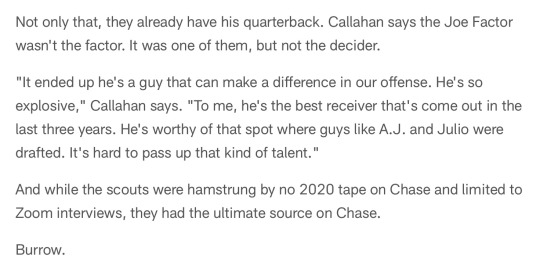
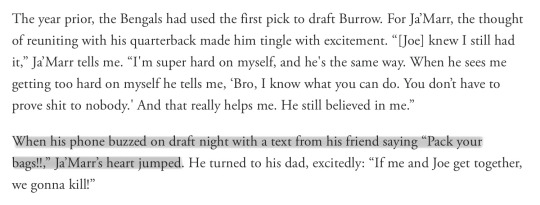
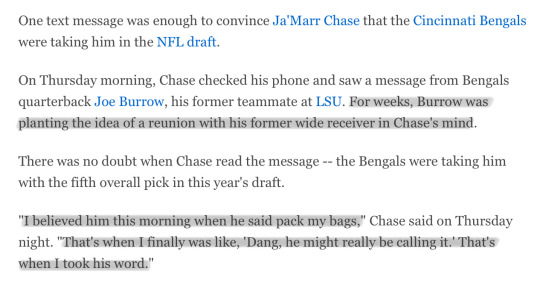
1 — “have you spoken to the cincinnati bengals and what would it mean to reunite with joe burrow there?” — “i have talked to the bengals. i don’t know how many times i’ve talked to them though. but, me and joe, you know, i wouldn’t mind going back with joe. if we go back together we’re trying to do nothing but get back our chemistry and have some more fun.”
2 — “i'm really excited for this draft. i don't really know what's coming but, you know, if me and joe could get back to it... i’d love to have some fun with him again.”
3 — “i assume you'd be okay with a potential reunion in cincinnati if that were to happen?" — "yeah, i wouldn’t mind.”
4 — “me and joe talked about [a reunion] maybe like three, four times actually. we talked about it a good bit of times. he texted me this morning, just letting me know: ‘get your bags packed’, so i guess that meant that was gonna be the pick. i don’t know if that was a hint or what. so, he sent me that little text this morning, i was like ‘okay… i'm ready, bro’.”
5 — “what was your reaction like when he was lowkey recruiting you?” — “i actually was believing him sometimes, sometimes i was like ‘stop playing with me’ and sometimes i was just like ‘okay bro, i gotcha, i'm ready now’ so. i believed him this morning when he told me, you know, pack my bags. so that's when i finally was like: ‘yeah he might really be calling this’ so that's when i took his word.”
6 – “jimmy burrow, did joe tell you—he’s always been kind of coy about what he said to the bengals—did joe tell you that he wanted the bengals to select ja’marr?” — “yes, i think we figured that… and eventually… yes, he pretty much told us that he wanted ja’marr.”
7 — “it was like a week before the draft, ja'marr said: ‘dad, joe texted me.’ […] he didn't say what he said, you know. but he said: ‘joe just texted me’, [...] so he had talked to joe like... or texted with joe once or twice that week. and then he told me, he said: ‘dad, if i get with joe, we're gonna kill’ [...] so he was all excited about getting with joe.”
8 — “what was the first thing joe texted you when you got drafted by the bengals?” — “make sure your bag's packed and ready. yeah, that was what he told me.”
9 — “the cincinnati bengals are on the clock now. earlier that morning, i had got a text from joe. he said: hope your bags are packed. i know it's me, at the moment, that's what i'm saying to myself. i can't wait to be a part of it.”
10 — articles: 1, 2, 3, 4
#wasn’t gonna post this#but then one of my friends asked me about the whole draft-texting-reunion-saga#so i tried to compile a timeline#added it to the joe’marr google doc that i made for my friends (who WILL be turned into nfl fans even if it's against their will)#and then i figured i might as well edit it together and upload it cause i do kind of wanna have this on here#anyway i guess the timeline on this is#some very limited communication between them during the season#as evidenced by that one pre-draft interview with joe in which he was like ‘yeah we still talk now and again’#then the frequency increases a little bit as they're starting to realise how well-positioned the bengals are gonna be in the upcoming draft#joe is reportedly being kept ‘in the loop’ re: the drafting/scouting process#starts seeing a real possibility of playing with ja’marr again#and begins cautiously mentioning the idea of a reunion around ja’marr#who is clearly a lot more hesitant unsure guarded etc etc regarding the whole thing#doesn’t know if joe is being serious maybe doesn’t wanna get his hopes up and risk being disappointed#(‘sometimes i was like stop playing with me’ and: ‘i didn’t believe it but then he provec me wrong’)#and then ofc the whole thing culminates in the text joe sends him#sidenote: i love ja’marr’s somewhat inconsistent narrative here#(i'm saying this as if he doesn't ALWAYS have theee most unrealiable narration lol)#like........ was it the evening before….. or the morning of.…..#and what exactly was the wording of that message#because he keeps alternating between ‘we're coming to get you’ and ‘make sure your bags are packed’#truly one of my favourite aspects about this ship is how much detective work you gotta put into#figuring out what the hell is going on between these two#which is made considerably more difficult by joe never commenting on these Highly Important Topics#and ja'marr who will truly just. say anything.#ANYWAY enough rambling pleeaaase let me know if i forgot anything or if you guys have extra content/opinions/interviews re: this entire saga#ja'marr chase#joe burrow#joe'marr#joemarr
38 notes
·
View notes
Text
i just finished the prologue of the mota book and i don't know how i haven't seen a single post talking about how after john and gale's stalag reunion, they were then separated for another four months.
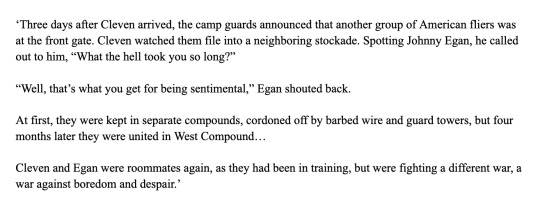
my heart is aching so bad. imagine being reunited (after almost three weeks, oct 8–26th) and having that tiny feeling of 'everything is going to be okay' and then being ripped apart again for four fucking months. 120 more days of not being able to be at each other's sides.
#let out an actual pained noise when i processed the sentence#went back and reread three times to ensure i wasn't reading it wrong#johnslittlespoon mota book#<- gonna be posting stuff from the book there as i read#but yeah what in the fucking sick twisted joke#how did they not mention this in the show#also the way john is called 'johnny egan repeatedly' makes me want to put my fist thru drywall#do you think they could see each other/talk through the fence#i can't do this i rly can't#there's no way i'm not gonna write a oneshot about the second reunion that comes after those four months#johnslittlespoon brainrot#buckbucky#buck x bucky#clegan
311 notes
·
View notes
Text
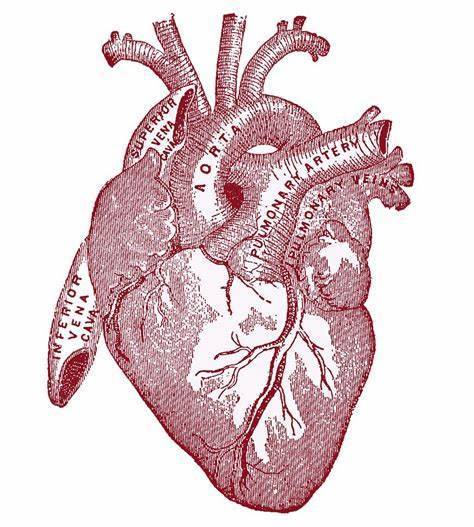
The Consciousness of the Heart
I am a big fan of public television mysteries, especially those made in Europe. Good acting, intricate plots. So here’s a summary of a French mystery I just saw:
A woman gets a heart transplant and immediately begins having nightmares involving the heart donor and her own teenaged daughter, whom the woman and her husband had adopted at birth. Turns out the heart donor was a young woman who died in a car crash, but the nightmares indicate to the woman that the girl’s death was not an accident.
She meets the adoptive father of the young woman; he too believes his daughter’s death was no accident; so they team up to find out what really happened; her teenaged daughter gets pulled into this detective work too.
We find out that both daughters had issues about being loved related to being adopted. Lots of twists and turns in the story due to this, after which...the new heart comes close to failing. But, seeing her mom so sick, the teenaged daughter realizes how much she loves her mother. The young woman’s father becomes aware of how he tried to push his daughter into a career in medicine (his career) rather than letting her be the singer/musician she wanted to be.
In the only way that he can communicate with her now, the father places his hand on the woman’s chest above his daughter’s heart, and, speaking to his beloved deceased child, apologizes to her heart for his lack of awareness of her needs when she was alive.
You can guess the rest: The transplanted heart settles down, the woman gets better, the teenaged daughter gets over her own anxieties —and by the way, they catch the man who murdered the daughter by forcing her car to crash.
Well, it was way better than it sounds.
But here’s what really caught me—that scene where the dad talks to the heart of his daughter. As if the heart carries its own consciousness and he was able to communicate with it.
Even more than European mystery dramas, I love stories about consciousness-- there’s a literary conceit that involves a body part being transplanted into another person and taking control of the hapless recipient—say, someone gets a hand transplanted from an executed criminal and the hand takes over to steal or murder –sinister stories, even tales of horror.
An alien consciousness inside one’s own self. We are familiar with this theme. And part of what makes these stories work is the notion of the implied consciousness of the body part, the power of the body part, for example, of a hand that has its own mind.
In our age, we are used to the notion that consciousness dwells in the brain, we don’t find that strange at all. But many peoples have believed that consciousness dwelt as well in the heart. The heart responds by quickening, by aching, by urging action, or by relaxing into peacefulness. It rises up to greet its love; it sinks into despair. It feels. It seems conscious. Now we can trace the complex biological directives that guide the heart’s functioning, the chemicals and mechanisms that control it. But still, subjectively, the heart feels.
We have a complicated relationship with our hearts from this perspective. The heart as a conscious part of us that may have inconvenient feelings. It is in a sense an alien consciousness within us. I am speaking of course of emotions. And how we can harden our hearts, turn against tender feelings, deny that affective link. I’ve done it and I bet you have, too. Other emotions are there to step in—rage, fear, greed, lust.
Dr. King said he could not figure out how to reconcile the contradictions in humans (we can be so good and also so evil) until he recognized the power of love, which must be our guide.
I had a hateful spell the other day. I was, as my mother cautioned me against in the past, “being ugly.” Judging somebody harshly. Thinking about a situation that had come up that was not gonna be easy to resolve with some other people. Money was involved, of course. Odd how that often happens.
Several of us talked together, trying to come up with a solution. Someone suggested a generous resolution and then someone else countered with another generous perspective. That night, in bed, I lay there imagining how this conflict could maybe turn out to be a victory for love. I crossed my hands over my chest, above my heart, and breathed.
[Lynne McFarland]
9 notes
·
View notes
Text
The beginning is the end is the beginning…

New, tear-jerker comm for Chapter 45 Streets of Gold 🥹
Here is the very first scene I envisioned; this is where it all began, though it was the end. See my Ch 45 end notes for the dissertation on this piece 😆
THANK YOU, Sin (ratinthemud on X) for bringing this magical moment to life 🙏♥️🥲
#obikin#fanart#streets of gold#chapter 45#the reunions#I cannot believe how perfect this is#still processing after 2 days
51 notes
·
View notes
Text
Have another drawing process...
Reunion part 3 - Page 9
_______________________
This is a bigger Bowuigi project in the making, which has no beginning yet.
It started with the Coronation as a single short story. Now I'm working it out.
Here is what I have so far;
Coronation
Reunion part 1
Reunion part 2
Reunion part 3
___________________
After reunion part 5, I will start at the beginning.
It is all over the place, I'm sorry😅
#bowuigi#bowuigi fanart#bowuigi comic#reunion#reunion part 3#drawing process#king luigi#king!luigi#super mario au
158 notes
·
View notes
Text

Phi Arthit Kongpob, is that you (eyes on those pink milk and iced coffee)
#just realized this *cry*#kristsingto#kongart#kongpob x arthit#sotus#the ex morning#the ex-morning#gmmtv 2024#gmmtv 2024 part 2#still processing that they got p'aof writing original script + reunion with the sotus' director#i should gif another trailer but i can't move from here why
137 notes
·
View notes
Text
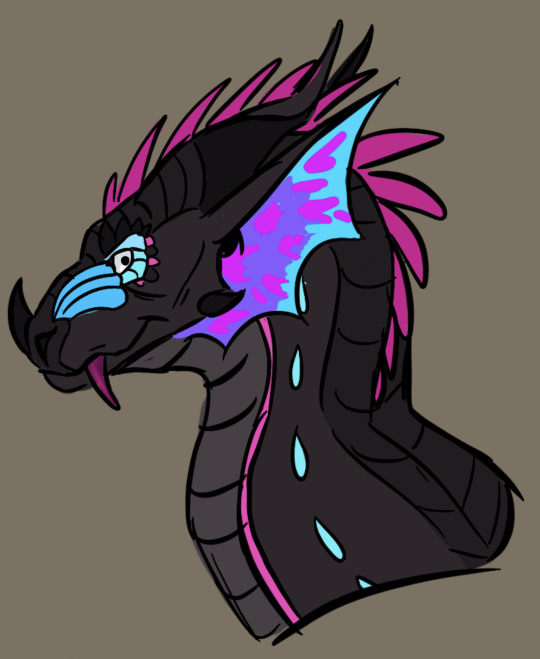
Luxaeterna, a participant in the first true battle of the war between the Rainwings and Icewings, the Battle of Stolen Light. Her venom-fangs were torn out by an Icewing poacher, and after surviving and avoiding capture, replaced them with harder gemstone teeth. She’s well known for the number of Icewing skulls she’s impaled throughout the war. She is Boomslang and Quetzal’s great aunt. Postwar, she has been reunited with her living grandnephew and accompanies him for scale retrieval in the Ice and Sky Kingdoms.
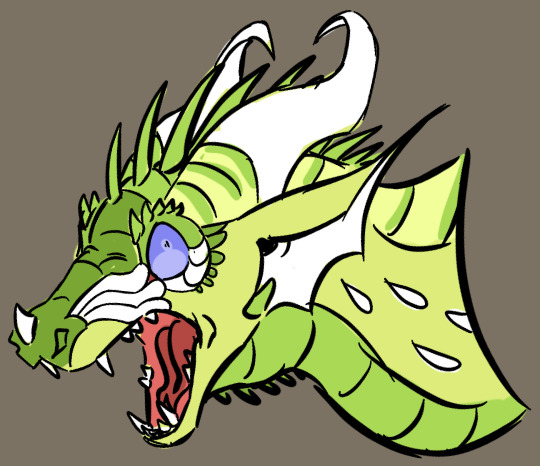
Quetzal in his last moments before being murdered by an Icewing poacher. He had sold Boomslang’s egg to the Icewings in the hopes of gaining immunity from the scale trade- but he learned far too late that a bargain can’t be kept with someone who wants to wear your skin.
#wof#wings of fire#oc#my art#luxaeterna#quetzal#scale retrieval is going to the kingdoms participating in the rainscale trade and-#confiscating anything made from rainwings to be brought home for identification#this also includes live farm prisoners/poaching victims#the identification is helped by the scientific community within the rainforest’s nightwing village#but (as you can probably imagine) its a deeply stressful process for everyone who’s missing someone.#the hope that you’ll have a venom match with anyone who’s been returned alive#and the dread of the possibilty that your reunion will be with an objected your loved one was turned into.#i cant wait to talk abt the nightwings here btw bc they have some shit going on here.#(rainforest village is very clearly against the rainscale trade but the peninsula kingdom participated in poaching)#edit wow i was nearly asleep typing those tags uh.#*objected is meant to be object#beneath her talons
81 notes
·
View notes
Text


THE USOS REUNITE WWE SMACKDOWN (OCTOBER 25, 2024)
#no useful tags just me bitching lmao#i am SO unmoved#im praying theres more to all this than them just speedrunning this reunion just so certain things can line up in time for ple shows#and so wrestling fans with less than one braincell can get the instant gratification of their favwit tag team together again 🥺#bc oh bite me lolllll#so much of this ~cinema~ is starting to feel rushed and im just hoping theres turns or angles or REASONS for it#but thats asking me to trust wrestling with carrying storylines fully and i do NOT#the things i wanted most from this story were jey getting proper acknowledgement/vindication and apology for his abuse#and explanation for why the family treats solo as they do (and then expect him to be a well adjusted adult lmao)#jey has NO reason to forgive them yet like did they buy him hallmark cards behind the scenes?#and theyve done much worse to him for much longer the new bloodline#you dont get to brag about this being the greatest slowburn long term cinema storytelling and then just....#im HOPING so bad its not just as simple as it looks i am#they keep swearing theres so many more 'innings' to this so idk prove me wrong please literally do#but that still wont make me moved by ✨og bloodline reunion✨#bc what yall mean yall are still the heels in my eyes like why do you have so many family members yall left on the side of the road#while talking about family above all and dont divide family lmao#and i get ~twin bond~ but LORD#actually that twin bond excuse is evil too#solo go bring in jeremiah since hes technically part of wwe canon too and beat their asses together actually lmao#i aint forgot jey saying something like having brothers is great but how being a twin is just different/special#like yeah sure but can you not make your other siblings sound like secondhand brothers or whatever shdhfhjf#ok im done. for now. for this post. maybe.#venting about my interests is fun for me ok#its how i process the information given to me and understand it#and also i like to bitch
29 notes
·
View notes
Text
i know JUST yesterday i posted a snippit of the Ossuary fic madness i'm currently going through which is around 2800 words now. but at 4am the insanity REALLY took hold and i wrote 1500 More words of later game Spite POV on my notes app in bed because I Can Make Him So Much Weirder. unfortunately making it weirder also means its 75% unintelligible to anyone else so the Ossuary lucanis fic does need to happen first for there to be any Hope of this being comprehendible later but. man i did miss writing something more out there. i know the Weird Shit gets the least attention of the things i write but for the like 9 people who enjoyed my fics like teeth against his heart & the people you love become ghosts inside of you. the spite one will be even more so...
#i do actually have like. a full 6000 word thing i already wrote thats way more normal for rook/lucanis lighthouse reunion#but the thing is its not Weird enough and so i simply havent felt the desire to share it. even tho i think its good smut#but it needs more build up but i dont have Long Fic energy in me so. idk. hm#i have done this whole process very backwards really with all these endings before the start#but the ossuary one is a start AND weird so i must focus on that. first.#ramblings#my writing#jade plays dav#datv spoilers#da4 spoilers
16 notes
·
View notes